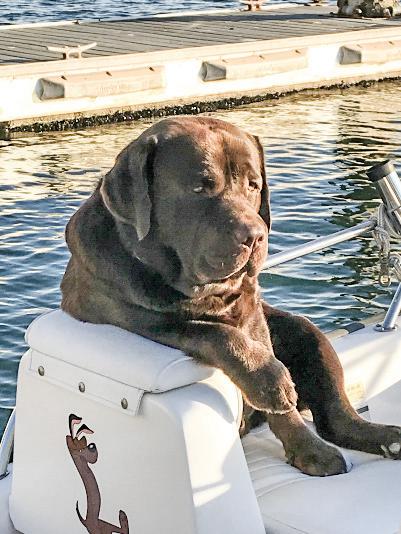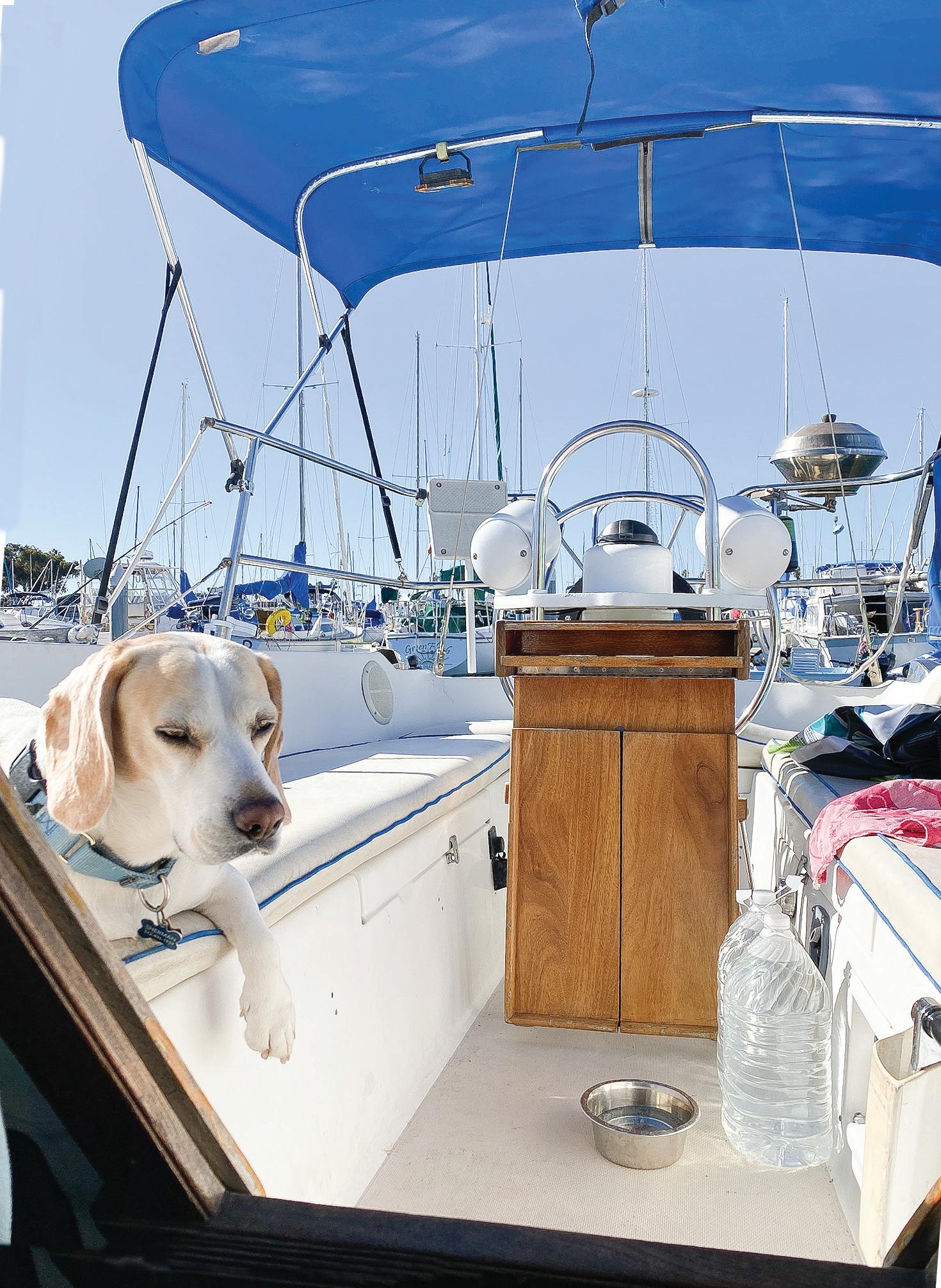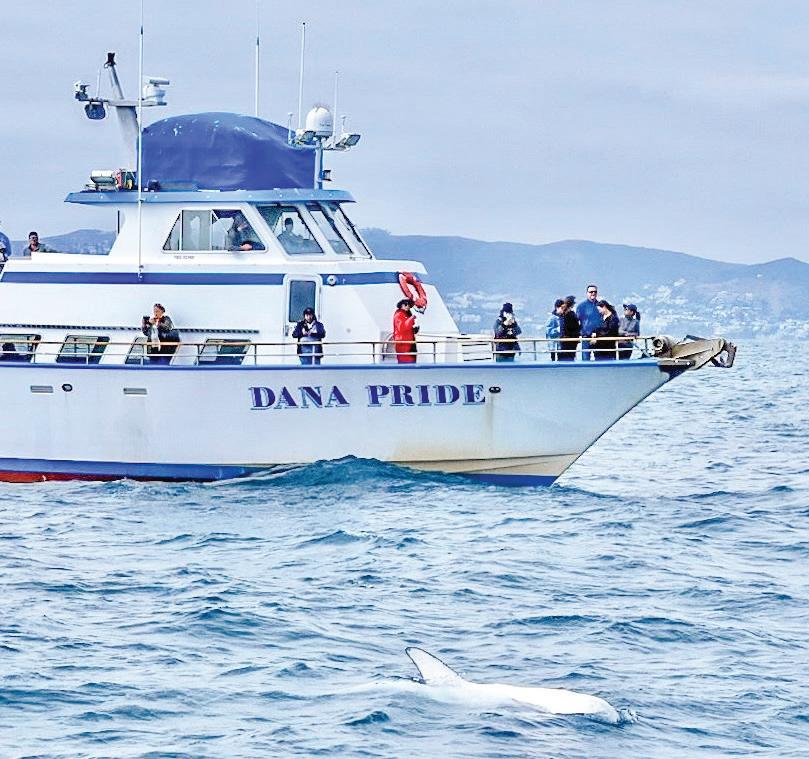
8 minute read
Ask an Attorney
California’s Boating and Fishing News
Founded in 1971
NO. 1156 JUNE 11 – JUNE 24, 2021 WRITE TO:
P.O. Box 1337 Newport Beach, CA 92659 (949) 660-6150 (800) 873-7327 Fax (949) 660-6172
EDITORIAL/CREATIVE
(949) 660-6150
Staff Editor
Jordan B. Darling (949) 503-7654 jdarling@goboating.com
Staff Writer
Lindsey Glasgow (949) 503-7690 lindsey@thelog.com
Graphic Artist
Julie Hogan
Production Artist
Meredith Ewell
Contributors
J.R. Johnson, Catherine French, David Weil Publisher Duncan McIntosh, Jr. duncan@thelog.com
Vice President and General Manager
Debbie Brock dbrock@duncanmcintoshco.com
Operations Manager/ Sea Magazine Editor
Jenny Scroggins seaeditor@goboating.com
ADVERTISING SALES
(949) 660-6150 Fax: (949) 660-6172 Susanne Kirkham-Diaz (California) (949) 503-7693 susanne@goboating.com Daniel Voet (California) (949) 503-7679 dvoet@goboating.com Felice Lineberry (Northwest) (949) 503-7692 felice@goboating.com
CLASSIFIED ADVERTISING
(800) 887-1615 Jon Sorenson jon@thelog.com
SUBSCRIPTION SERVICES
(800) 887-1615 circulation@seamag.com
THE LOG ONLINE AND NEWSLETTERS
thelog.com
BOAT SHOW HOTLINE
(949) 503-7536 Newsletters For the California boating newsletter and FishRap Newsletter, go to thelog.com
The Log, San Diego Log and FishRap are registered trademarks of Duncan McIntosh Co. Inc. Copyright 2021, all rights reserved. No part may be reproduced in any form without the prior written permission of the
POSTMASTER: Send address changes to The Log, PO Box 1337, Newport Beach, CA 92659. SUBSCRIPTION PRICE: One year, $39.00 by third class mail. Subscriptions are transferable but not refundable. Call us at (800) 887-1615. The Log is published every other Friday and distributed throughout Southern California.
LEGAL ADVICE ask a maritime attorney
By David Weil
What do I need to know about starting a chartering business?
QUESTION: I own a 50-foot sailing yacht and I would like to start a charter business. Our home port is Marina Del Rey, California and we would offer the boat for harbor cruises and for overnight trips to Catalina. What legal issues should I be concerned about before I get started?
ANSWER: A new charter business will need to address a lot of issues. Marina restrictions, passenger parking, liquor licenses, and a hundred other details must be considered. But the important legal issues can probably be divided into four main categories: The boat, the operator, city permits, and insurance. Your first legal issue concerns the construction of the boat. The United States is one of many nations that protects its domestic transportation industries through “cabotage” laws. These laws require the transportation of passengers or cargo between U.S. ports to be performed aboard “U.S. flagged” vessels (vessels registered under the laws of the United States), and U.S. built vessels.
Many sailing yachts in the 50-foot range in this country are foreign-built. A foreign-built vessel may not legally carry passengers for hire in this country unless the owner obtains a waiver of the restriction, or the operation is structured in a way that avoids the restriction through a “bareboat” charter (discussed below). Information regarding a waiver of the U.S. construction requirement is available on the internet website of the United States Maritime Administration https://www.maritime.dot. gov/ports/domestic-shipping/ small-vessel-waiver-program
If your boat is U.S. built or has a waiver, and it is 100 gross tons or less, you may carry up to six paying passengers (the limit is increased to 12 passengers for vessels over 100 gross tons) without the need for Coast Guard inspection. These are often referred to as “six-pack” or “twelve-pack” charters. A Coast Guard Certificate of Inspection will allow the carriage of more passengers, but compliance with the Coast Guard’s inspection standards are very expensive and conversion of an existing boat to an inspected boat is usually cost-prohibitive. Coast Guard inspection for passenger service also usually requires the assistance of an experienced marine architect and it should not be confused with the courtesy inspections conducted by the Coast Guard Auxiliary.
The next issue involves the operator of the vessel. The master of any vessel that carries passengers for hire must be licensed by the Coast Guard as a Captain, for the class of service in which the boat is operating. Further, since our reader is interested in operating overnight charters, the Coast Guard may require an additional licensed crew person to be aboard if the vessel will be underway for extended periods. Contact the Coast Guard’s local Marine Safety Office for information specific to your proposed operation.
Next, you will need to com-
Please see ATTORNEY, PAGE 13
David Weil is licensed to practice law in the state of California and as such, some of the information provided in this column may not be applicable in a jurisdiction outside of California. Please note also that no two legal situations are alike, and it is impossible to provide accurate legal advice without knowing all the facts of a particular situation. Therefore, the information provided in this column should not be regarded as individual legal advice, and readers should not act upon this information without seeking the opinion of an attorney in their home state.
Dog Aboard
Is your pet as avid a boater as you? Send The Log pictures of your four-legged fi rst mate. Email your photo, contact information and a description about your pet and boat to thelogeditor@thelog. com
COME SAIL AWAY WITH MAX
Lemon Beagle Max enjoys being on the water and is always ready to sail away with the tide, what a water dog. “Max, my seven-year-old Lemon Beagle is always ready to sail away,” said Jeff Sherman in an online submission.

A DOG NAMED TUG
Chocolate Lab Tug, chills out in style aboard his paw-rents whaler in Alamitos Bay. “Tug chilling on the Whaler in Alamitos Bay!” said the submission from the Utterback family.


By: JORDAN B. DARLING
DANA POINT— Dana Wharf Whale Watching’s Ocean Adventure, captained by Chase Moore, spotted a rare white Risso’s dolphin on May 18.
The dolphin was in a mixed pod of bottlenose and other Risso’s dolphins.
The dolphin is not albino, but rather it’s leucistic, according to a Dana Wharf naturalist Laura Lopez. Leucism is a recessive gene that gives a white color to fur, feathers, or skin of animals that would normally have a different color, while albinism is an anomaly that causes a defi ciency of melanin caused by an absence or defect of the enzyme tyrosinase, according to a 2014 blog post from the Dolphin Project. Animals with leucism are able to retain pigment and often have normal or dark colored eyes. Risso’s dolphins hang around tropical and temperate waters and are known for their characteristic blunt-head and gray-white mottling.
The Risso’s dolphin got its name in 1812 from French anatomist Georges Cuiver who named it for naturalist Antoine Risso, according to the Monterey Bay Aquarium.
Also, according to the aquarium, there are somewhere between 11,000 and 16,000 Risso’s dolphins off the coast of California and the Pacifi c Northwest.
The white dolphin has reportedly been seen up and down the California coast between San Diego and Catalina, including a reported sighting in Laguna Beach days prior.
“This dolphin has been seen at least three times since 2018 from San Diego to Catalina but never seen by one of Dana Wharf’s vessels until now,” said a May 21 email from Dana Wharf Whale Watching.
LATEST NEWS UPDATES blips on the radar
BUDGET SUBCOMMITTEE RECOMMENDS REJECTING VESSEL REGISTRATION FEE INCREASE
By Lindsey Glasgow
WHAT HAPPENED: On May 14, Governor Gavin Newsom submitted his 2020-21 May Revision budget proposal to the Legislature. The proposed 2021-22 budget in January included a potential increase in the two-year California recreational vessel registration fee from $20 to $70. After signifi cant input from boating advocates and boaters, the proposed fee for the reduced to $40 in the revised 2021-22 budget in May. The fee increase was proposed by California State Parks to address a defi cit in the Harbors and Watercraft Revolving Fund, the primary fund source for boating programs managed by the California Division of Boating and Waterways.
The revised budget also requested $10.7 million from State Parks’ General Fund be transferred to the HWRF annually from 2021-22 to 2024-25 to cover costs associated with the aquatic invasive species (AIS) program.
WHAT’S ON TAP: The Senate Budget and Fiscal Review Subcommittee No. 2 on Resources, Environmental Protection and Energy met on May 25 and held a hearing on the budget item. The sta recommendation was to reject the governor’s proposed increase in the vessel registration fee. The sta recommendation also proposed providing an additional $9.3 million from the General Fund annually from 2021-22 to 202425 to support the HWRF and adopting budget bill language that requires State Parks, in consultation with stakeholders and sta of relevant fi scal and policy committees of the Legislature, to develop a proposal that includes a combination of fee increases, expenditure reductions, and other actions designed to keep the fund in structural balance on an ongoing basis. The budget bill language would require the department to present this proposal to the Legislature for consideration no later than January 10, 2023.
The subcommittee recommendations will now go onto the full Assembly and Senate budget committees, which will decide whether to accept or amend the changes, which is likely to happen the week this paper goes to press. The Legislature has until June 15 to pass a budget and the governor has until July 1 to sign a budget. The Log will continue to follow and provide updates.
Fast Facts
From page 4 bara Channel released about 80,000 barrels of oil into the waterway. The spill inspired the first Earth Day and raised environmental concerns about the safety of offshore oil exploration, development, and production, which delayed further drilling for a number of years.
Installation of new platforms resumed in the late 1970s. According to a June 3, 1974 Desert Sun article, the U.S. Department of Interior announced in January 1974 its intention to lease some of the 7.7 million acres of continental shelf lying outside the state’s three-mile territorial limit between Point Mugu and Dana Point. The state Lands Commission, meanwhile, had also lifted its five-year moratorium against drilling new wells in the stale’s offshore domain, the article also reported.
In 1994, the State Lands Commission placed the entirety of California’s coast and state waters off-limits to new oil and gas leases. Despite multiple attempts to lock in a West Coast drilling ban over the years, new oil and gas leasing continue to be allowed in federal waters off the Southern California coast, but no new platforms have been erected since 1989 (Nevarez et al. 1998), according to Love.





